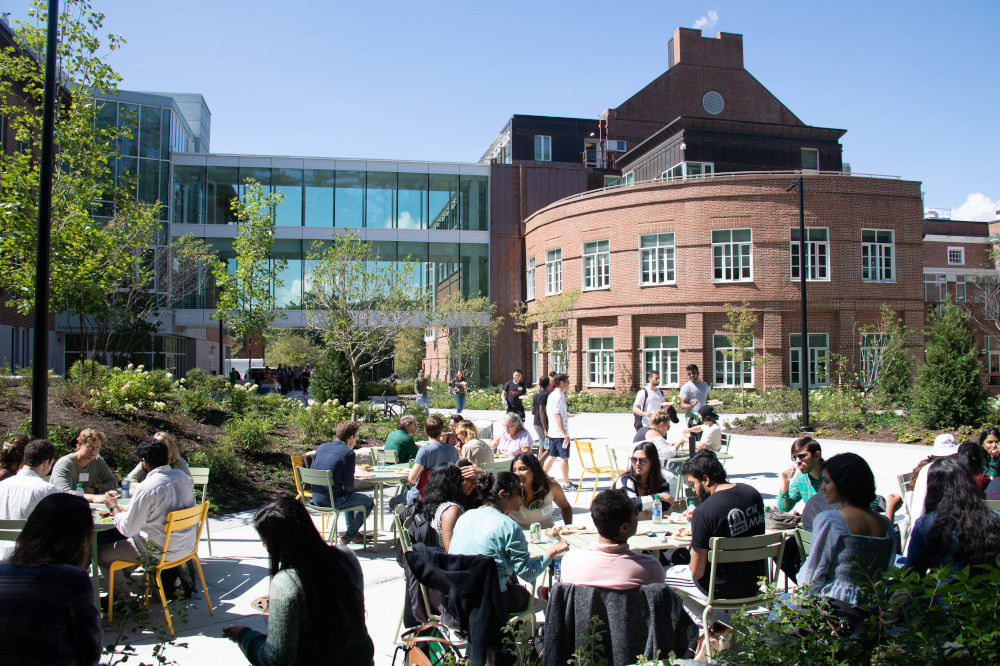Responsibilities of the Position
Reporting to the director of the department of safety and security and emergency operations, the associate director supports the director in the leadership and management of the department and works directly with all activities associated with the department’s day-to-day and long-range operations and goals, and will keep the director informed about daily operations and incidents. The associate director will serve as the administrator in charge in the director’s absence. Further, the associate director is the accreditation manager tasked with advancing the department’s accreditation efforts. The associate director will partner with the director in supporting and promoting the department’s customer service tone, including addressing the needs of a diverse community and promoting the department’s posture of supporting educational opportunities, where wellness, safety, and security, not enforcement, are at the forefront of all the department’s services.
This position requires extended work hours, re-call for emergencies and other critical situations, and on-call 24 hours a day upon assignment. The associate director oversees the investigations and operations managers and leads the department’s crime prevention efforts and the implementation of safety standards for campus physical security, access control, and crime prevention through environmental design (CPTED).
Key responsibilities include:
Operations Management
- Plans for, manages, and coordinates department operations functions, including administration, operations, investigations, and compliance.
- Revises and/or generates and contributes to the development and organization of administrative and operational policies and procedures for all areas of the department in support of accreditation.
- Has direct responsibility and accountability for the general patrol function of the department, communications operations, crime prevention, and department training and professional development.
- Works closely with the Clery compliance coordinator and the emergency manager in operations-related issues of Clery compliance and emergency planning and response.
- Identifies operational needs and develops and implements plans, procedures, and actions to resolve identified requirements.
- Resolves operations-related problems, interpreting and applying policies as unique situations may require.
- Conducts and analyses surveys regarding department activities and collects and analyses data related to department operations to make recommendations and implement operational changes.
- Partners with department investigators in special assignments and investigations; carries out the department’s internal affairs responsibilities.
- Assists in coordinating a college-wide emergency response plan, including emergency communications, and plays a leadership role in the institution’s emergency planning group (EPG) and the incident response team (IRT).
- Prepares detailed operation plans for special events such as commencement, bonfire, homecoming weekend, dignitary visits, etc.
- Coordinates crime prevention efforts and serves as physical security liaison to project management services (planning, design & construction) and the facilities, operations, and management’s (FOM) access control shop.
Accreditation
- Champions and coordinates the department’s International Association of Campus Law Enforcement Administrators (IACLEA) accreditation process.
- Revises and updates existing department directives and, when appropriate, researches, writes, and implements new directives to comply with accreditation standards.
- Maintains accreditation files, coordinates proofs documentation, and manages accreditation-related regular and recurring inspections.
- In collaboration with the training coordinator, prepares and coordinates training and training accountability to ensure all staff understand and follow all department policies and procedures.
- Establishes working groups for reaching and developing standard operating procedures and other directives.
- Maintains, enforces, and updates the written directives system so all staff have access to the most up-to-date information and assures directives are produced and tracked according to established procedure.
- Develops and implements procedures to measure program effectiveness and levels of safety and security professional services to the community.
- Researches and captures legacy practices and turns them into written standard operating procedures.
- Develops forms and schedules to maintain and track accreditation compliance.
Department Liaison and Community Representation
- Represents the department across the institution and establishes working relations with other departments, divisions, and student organizations.
- Champions a community-oriented and initiative-taking approach to department responsibilities and services aligned with developing programs that support community needs.
- Oversees the development, implementation, and delivery of outreach/education programming and crime prevention offerings.
- Establishes, promotes, maintains, and enhances positive working relationships with diverse members of the Dartmouth community, promoting the department’s customer service tone and supportive posture.
- Conducts outreach to and maintains working relationships with local community organizations and local, state, and federal law enforcement authorities.
- With the director, promotes the programs and image of the department through public relations endeavors.
- Represents the department at local, regional, and national meetings and conferences.
- Represents the department on various institutional committees within the Hanover community and with local, state, and federal agencies.
- Regularly represents the department in meetings with students, student organizations, student affairs, and other administrative offices.
Leadership Continuity and Emergency Management
- Works with the director to develop and implement departmental operations, policies, procedures, and operation plans.
- Collaborates with the director in developing three-, five-, and ten-year strategic plans.
- Actively participates and contributes to the leadership of the institution’s emergency planning group (EPG) and the incident response team (IRT).
- Promotes and maintains a team perspective for the department and its operations, coordinating and ensuring successful implementation of new department and institution initiatives.
- Assists the director in creating and maintaining a department-wide customer service-oriented culture emphasizing safety first by establishing standards of service and response.
- Assists the director and supports the department’s crime prevention efforts in establishing and implementing safety standards for campus physical security, access control, and crime prevention through environmental design (CPTED).
- Participates in management/labor meetings and contract negotiations, meets regularly with union representatives to maintain and ensure open communication and collaboration, and participates in the resolution of grievances.
- Maintains leadership continuity and succession of authority and, in the absence of the director, assumes leadership of the department; partakes in the 24-hour-a-day on-call rotation.
- Takes on special projects as requested by the director.
Staff Development and Training
- Participates in the department’s recruiting efforts, including interviewing, and recommending candidates for hire.
- Supervises, carries out progressive discipline, and conducts annual performance evaluations of assigned personnel in respective areas of responsibility.
- Provides guidance/recommendations on termination and disciplinary issues.
- Ensures yearly development/performance plans and evaluation of individual management staff, emphasizing development and fulfillment of annual goals and performance objectives.
- Coordinates and facilitates the development of a standardized field training officer program for all classifications of employees within the department and establishes the yearly training objective in collaboration with the training coordinator.
- Chairs various internal department committees and facilitates training and active personnel participation and involvement.
- Attends regional and national professional conferences and identifies and recommends attendance for management personnel for their respective areas of responsibility.
Qualifications and Characteristics of the Successful Candidate
The successful candidate will hold a bachelor’s in criminal justice, emergency management, or a related field (an advanced degree is preferred) with eight years of relevant security or law enforcement experience in higher education, preferably in a non-commissioned/non-sworn setting, and at least five years at a managerial or command level position in a unionized environment. The next associate director will have broad experience developing department directives (manuals, policies, standard operating procedures, operations orders, etc.) and developing and implementing safety and security training programs. Experience with accreditation, preferably under IACLEA standards, and extensive and varied experience in higher education, particularly in campus safety, campus security, or similar areas of responsibility, are required. The successful candidate will have experience researching and implementing software systems and applications for operational and administrative purposes (i.e., scheduling, records systems, emergency mass notification, safety apps, etc.); a demonstrated commitment to diversity, inclusion, and cultural competency through actions, interactions, and communications with others; and a dedication to diversity and to serving the needs of a diverse campus population.
The associate director will have strong leadership and management skills; excellent written communications, public speaking, and people skills; an innovative, creative, imaginative, flexible, and resourceful skillset; and have a familiarity with PMAM, PowerDMS, or other accreditation management systems, and be highly proficient with computer applications, including the Microsoft Office Suite. Demonstrated organizational, analytical, strategic thinking, and persuasion abilities, as well as the ability to design and conduct evaluations of programs and organizations, are all required qualifications. The associate director must be a team player and supportive collaborator, able to interact and communicate effectively and collegially with a wide range of constituents, including colleagues, faculty, administrators, students, and staff; have knowledge of laws, regulations, and policies (Clery, FERPA, HIPAA, VAWA, Title IX, etc.) related to safety and security in higher education; and be familiar with and aware of best practices and national trends related to safety/security and legal issues impacting higher education.
In addition to the qualifications stated above, key stakeholders identified the following capabilities and attributes of a successful candidate:
- Is an authentic communicator who consistently works to understand the varied interests, needs, and concerns of students and campus community stakeholders and how these relate to the work of campus safety.
- Possesses expertise in related compliance requirements and best practices, including accreditation, responses to alcohol and drug issues, bias incidents, and hate crimes.
- Embraces an educational philosophy for the entire department, ensuring officers understand their role as educators within the campus community.
- Possesses a solid understanding of policing practices and procedures within a non-armed environment.
- Has a demonstrated record of using data and predictive measures to evaluate and manage programs, services, and staffing; applies assessment and an understanding of institutional context to inform decisions.
- Has an understanding and appreciation for a student-centered, service-oriented environment and an ability to fully comprehend the integral role the department plays within the campus community.
- Possesses the ability to maintain high visibility and engagement throughout the campus and surrounding community.
- Has a demonstrated understanding of the various mental health issues college students face today.
- Possesses a willingness to truly take the time to listen and understand Dartmouth’s unique culture, needs, and values.
- Has a genuine willingness to work with and for students; actively engages students in community-based practices through continual open communications, positive daily interactions, and being responsive to their needs and concerns.
- Has a leadership style that is confident, approachable, collaborative, and transparent, with the ability to be firm, clear, and direct with staff.
- Is a strong supervisor willing to invest the time to know the staff and advocate on their behalf to ensure their needs and concerns are adequately addressed while effectively working to build a strong, empowered team with positive morale throughout the department.
- Possesses knowledge and substantial practical experience with all aspects of emergency management plans, preparedness, and training.
- Is highly committed to both professional and personal growth and development as a manager, leader, and campus safety expert; deeply committed to the professional development and training of staff.
- Has the ability to effectively foster strong partnerships with local and regional law enforcement and first responder agencies.

History of the Position
The previous associate director served the Dartmouth community for roughly two years before departing in November 2023. Dartmouth is conducting a national search for its next associate director.
Opportunities and Challenges of the Role
In transitioning to Dartmouth, the associate director will encounter the following opportunities, priorities, and challenges, as shared by key campus stakeholders:
- The associate director must review all current policies and procedures, implement new standards, convert practices into clear, comprehensive procedures, and prepare the department for accreditation.
- The department has a solid reputation across campus and has worked hard to maintain a safety-first approach, rather than be viewed as enforcers. The associate director must embrace this philosophy and ensure this continues to be the department’s ethos.
- Dartmouth is experiencing a good amount of change right now with a new president. The next associate director should understand this and expect some ambiguity as the campus navigates a new administration’s agenda.
- The department needs to review and possibly upgrade its technology to increase efficiencies and assist in collecting and disseminating data.
- The new associate director will find a robust and dedicated team of professionals in the department and benefit from a favorable relationship with the union.
Measures of Success
The items listed below will define the new associate director’s success throughout the first two years of employment:
- The associate director has gained the trust of the campus communities by being involved, visible, authentic, and engaged in all aspects of campus life.
- The associate director has reviewed policies and procedures and developed a plan to move the department toward accreditation.
- The Dartmouth community feels safe and comfortable with the associate director.
- The associate director has established strong relationships with key stakeholders across campus to elevate the collaborative work around campus safety.
- The department operates with a high level of professionalism and competence.
- Community outreach activities, services, and communication have been enhanced, emphasizing positive student engagement and educational initiatives.
- The associate director has worked with the director to clearly outline the department’s vision, goals, and expectations.
- The department is a disciplined, proactive force focusing on safety rather than enforcement.
- The associate director has established a formalized training plan to ensure all staff are consistently and properly trained, certified, and current on all safety and security techniques and departmental and institutional policies and procedures.
- The administration and campus community will have confidence in the department’s ability to handle crises.
- The morale within the department has improved; the staff feel supported, heard, and appreciated.
- Through consistent, confident leadership, the associate director has earned and maintained the department’s respect and is readily regarded as an active partner in supporting the institution’s educational mission.
- The associate director has formed meaningful working relationships with local law enforcement agencies, community associations, and partners.

Overview of the Department
The Department of Safety and Security provides Dartmouth College with professional safety and security services that include incident response, investigation, and follow-up of all security-related matters that come to its attention. They strive to engage their community via education, information sharing, and training programs as the strongest ally in deterrence and prevention.
The Department of Safety and Security reports to the executive vice president for strategy and special counsel to the president, and it is organized in a ranked structure comprised of dedicated women and men who serve the institution around the clock, with functions and services centered around five major operational divisions: communications, patrol, investigations, emergency management, and Clery compliance.

Jomysha Delgado Stephen
get to know
Divisional Leadership
Jomysha Delgado Stephen serves as the inaugural Executive Vice President for Strategy and Special Counsel to the President at Dartmouth College. Jomysha works closely with Senior Leadership to coordinate high-level strategic initiatives that span and engage multiple areas across the College. She oversees the Office of the President; the Department of Safety and Security; Internal Control Services; the Office of Government and Community Relations; the Office of Integrity and Compliance; Equal Opportunity, Accessibility, and Title IX; the Office of the General Counsel; the Office of the Board of Trustees, and Human Resources.
Before joining Dartmouth, Jomysha worked at Barnard College for 20 years. There, she served in numerous roles beginning as an associate counsel in the Office of General Counsel and, most recently, as Executive Vice President of the College and General Counsel.
Prior to Barnard, Jomysha practiced Commercial Real Estate Law at Battle Fowler LLP, Paul Hasting Janofsky & Walker LLP and Sonnenschein Nath & Rosenthal LLP. Jomysha earned her J.D. from Columbia Law School and her B.A., magna cum laude, from Barnard in Russian Literature and Language.
Jomysha serves on the board of the Fund for the City of New York and is a member of the National Association of College and University Attorneys, where she has served on the Membership Committee and is part of the Latino Lawyers Affinity Group.

Keiselim Alfredo Montás
get to know
Divisional Leadership
Keiselim (“Keysi”) Alfredo Montás became the director of safety and security in 2020 and served as interim director of the department since May 2017. He spent 25 years in public safety before coming to Dartmouth in 2007. As director, Montás is charged with hiring, training, and supervising security and dispatch staff. He is responsible for tracking the institution’s crime statistics to ensure compliance with the federal Jeanne Clery Disclosure of Campus Security Policy and Campus Crime Statistics Act, also known as the Clery Act, as well as emergency planning, preparedness, response and business continuity.
Montás acts as a liaison with area emergency services departments as well as with state and federal law enforcement agencies, a role that occasionally includes working with the FBI and the U.S. Secret Service, such as when Dartmouth hosts national and international dignitaries at events like commencement, national political debates, and other major functions. Montás is also responsible for Dartmouth’s emergency preparedness and response planning and oversees the emergency planning group and the emergency management and response group.
Before coming to Dartmouth, Montás spent seven years as the senior training manager at New York University’s Department of Public Safety. Prior to that, he was a senior field officer and investigator at the Vera Institute of Justice, a nonprofit research and policy group in New York City. He also spent three years as a police officer at the University of New Mexico, in Albuquerque.
Montás holds a master’s degree in Spanish language and literature from the University of Cincinnati and received his BA from Queens College. He has earned numerous certifications, including as a peace officer from the State of New York Municipal Police Training Council and as a security guard instructor from the State of New York Division of Criminal Justice Services.
In addition to his safety and security work at Dartmouth, Montás served for seven years, through 2015, as an adviser to the Tucker Center’s alternative spring break trip to the Dominican Republic, where he grew up. In 2016, Montás received Dartmouth’s Holly Fell Sateia Social Justice Award for his leadership in advancing diversity and community at Dartmouth. Montás is also a published author and an avid Argentine tango dancer.

Institutional Overview
Institutional History
Dartmouth’s root system weaves through many pivotal moments in the history of the United States. Founded in 1769, the College has shaped the education landscape and prepared generations of leaders to advance industries, societies, and cultures. Dartmouth’s founder, Eleazar Wheelock, a Congregational minister from Connecticut, established the College “for the education and instruction of youth of the Indian tribes in this land… English Youth, and any others.” Samson Occom, a Mohegan Indian and one of Wheelock’s first students, was instrumental in raising the funds necessary to found the College.
New Hampshire Governor John Wentworth provided the land on the banks of the Connecticut River that would become Dartmouth’s picturesque 269-acre campus. The setting gives Dartmouth a profound sense of place that has become one of its hallmarks. Its profound natural beauty was not lost on President Dwight D. Eisenhower, who remarked, “This is what a college should look like,” when he visited in 1953.
Dartmouth was the subject of a landmark US Supreme Court case in 1819 (Dartmouth College v. Woodward), in which the College prevailed against the State of New Hampshire, which sought to amend Dartmouth’s charter. The case is one of the most important and formative documents in United States constitutional history, paving the way for American private institutions to conduct their affairs in accordance with their charters without interference from the state. Politician, statesman, and Dartmouth alumnus Daniel Webster, Class of 1801, passionately argued for the original charter to be preserved. “It is … a small college,” he said, “and yet there are those who love it.”
During its first 200 years, Dartmouth did little to actualize its founding commitment to Native students. In 1970, Dartmouth reaffirmed its founding mission and two years later, established one of the first Native American programs in the country. Today, 200 Indigenous students—representing more than 70 different tribal nations and communities—attend the College. Dartmouth counts over 1,200 Native graduates among its alumni.
With a celebrated liberal arts curriculum and pioneering professional schools, Dartmouth has forged a singular identity, combining its deep commitment to outstanding undergraduate liberal arts and graduate education with distinguished research and scholarship. The College has been at the forefront of educational invention, continually identifying new methods of enhancing the impact of higher education, such as the Rassias Method® for foreign language instruction. Now a worldwide phenomenon, the method was invented by Dartmouth Professor John Rassias in the 1960s.
Dartmouth’s groundbreaker DNA is also borne out in its professional schools: the Geisel School of Medicine, the nation’s fourth-oldest medical school; Thayer School of Engineering, one of the nation’s first professional schools of engineering; and the Tuck School of Business, the world’s first graduate school of management. Dartmouth is also the first school in the world to offer a graduate degree in health care delivery science.
In 2017, Dartmouth topped the Ivy League in Nature’s Innovation Index, awarded for the greatest number of scientific papers that lead to patents. And the College has been rated in the top ten of all schools for undergraduate teaching by US News & World Report for the entire lifetime of the rankings—including several years at number one.
Diversity Statement
Diversity at all levels is critical to Dartmouth’s mission of providing an environment that combines rigorous study with the excitement of discovery. As an institution of higher education, Dartmouth is defined by the belief that a multiplicity of values and beliefs, interests and experiences, and intellectual and cultural viewpoints enrich learning and inform scholarship.
Respect for the cultures that make Dartmouth a dynamic teaching, research, and service environment is a bedrock institutional value. Dartmouth’s Office of Institutional Diversity & Equity provides resources across the Institution to promote access, respect, inclusiveness, and community in all of Dartmouth’s working and learning environments.
The Student Body
Total Enrollment: 7,204
Undergraduate: 4,905
Graduate: 2,299
Retention Rate: 98%

Sian Leah Beilock
get to know
Institutional Leadership
Sian Leah Beilock is the 19th president of Dartmouth. She is the first woman to have been elected president of Dartmouth by the Board of Trustees and began her tenure on June 12, 2023.
Beilock previously served as the eighth president of Barnard College at Columbia University. One of the most selective academic institutions in the world, Barnard is devoted to empowering exceptional women to change the world and the way individuals think about it.
Beilock is one of the world’s leading experts on the brain science behind “choking under pressure” in business, education, and sports. In the last several years, her research has focused specifically on success in math and science for women and girls and on how performance anxiety can either be exacerbated or alleviated by teachers, parents, and peers.
Application Process
Review of applications will begin immediately and continue until the position is filled. To apply for this position please click on the Apply button, complete the brief application process, and upload your resume and position-specific cover letter. Applicants needing reasonable accommodation to participate in the application process should contact Spelman Johnson at 413-529-2895 or email info@spelmanjohnson.com.
New Hampshire is a state that does not require public salary disclosure. For more information, please contact Heather J. Larabee.
Visit the Dartmouth College website at home.dartmouth.edu.
Dartmouth College is an equal opportunity/affirmative action employer with a strong commitment to diversity and inclusion. We prohibit discrimination on the basis of race, color, religion, sex, age, national origin, sexual orientation, gender identity or expression, disability, veteran status, marital status, or any other legally protected status. Applications by members of all underrepresented groups are encouraged.


